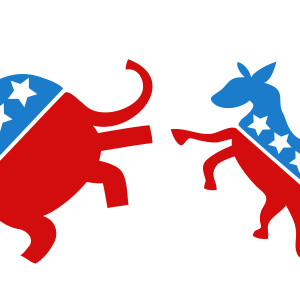In a recent Rasmussen poll, more than 30 percent of American voters said they think another U.S. civil war is likely. Not surprisingly, about the same number said the same thing during President Barack Obama’s second year. Democrats are presently and predictably more fearful than their Republican counterparts, to the tune of about 37 percent to 32 percent. Unaffiliated voters are somewhat more sanguine, but even so, 26 percent of them see political violence in the near future.
Though it’s silly to think that Americans will take up arms against one another, it is becoming clear why so many think it possible. Researchers Douglas Ahler and Gaurav Sood recently collected data that allow us to peer into the minds of average voters, and it is nothing short of fascinating to see what they think about one another, and even themselves. As it turns out, not only do Americans think all kinds of crazy things about their political opponents, they don’t even understand their political allies all that well.
Ahler and Sood asked people who identified as Democrats or Republicans some simple questions about each other. They asked Republican voters what fraction of Democrats are atheists or agnostics, black, gay or union members. Republicans wildly overestimated the numbers, guessing between 36 percent and 46 percent across the categories. The correct answers are 9, 24, 6, and 11 percent. Republicans think that Democrats are six times more likely to be gay and four times more likely to be union members than they actually are.
On the other side of the aisle, things were no better. Democratic voters estimated that 44 percent of Republicans earn more than $250,000 per year. The correct answer is 2 percent. Let that sink in for a moment. Democratic voters think that the number of Republicans earning over $250,000 exceeds, by a factor of 7, the total number of all people earning over $250,000. For whatever the reason, Democrats also thought that 44 percent of Republicans are 65 or older. The correct answer is 21 percent.
As bad as these overestimations are, voters on both sides were, puzzlingly, inclined to overestimate the percentages in their own parties in many of the same categories, leading the researchers to conclude that “the parties in our heads” are not the parties that actually exist.
And therein lies the key to understanding what’s going on in the heads of otherwise rational people who believe a second civil war is coming. We have come to regard politics as a team sport. We cheer for our “team,” not because we believe in what it stands for, but because it’s our team. As evidence, see the apoplexy among Democrats over President Trump’s insistence on curbing illegal immigration, a policy that is largely an extension of Barack Obama’s. Also see Republican apoplexy over Trump’s press secretary being refused service at a restaurant, while applauding bakers for not making a cake for a same-sex marriage.
As long as voters are at one another’s throats, extremist politicians win votes and the media win customers. The victims are truth, civility and reasonableness. We have only ourselves to blame. We no longer govern by reason and compromise. We govern by cheering our team into power and then pushing our preferred policies down the throats of our fellow citizens as quickly as we can before their team gets its turn at power, at which point they do the exact same thing.
We’re better than this.
We can start proving as much by getting outside the parties in our heads and understanding our allies and opponents for what they actually are: our fellow citizens. An assumption of good faith is the first order of the day. Without it, we will continually expect a civil war that is nowhere on the horizon. We will just treat each other as if it were.

